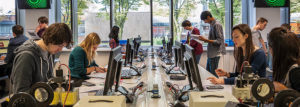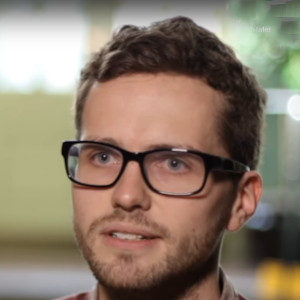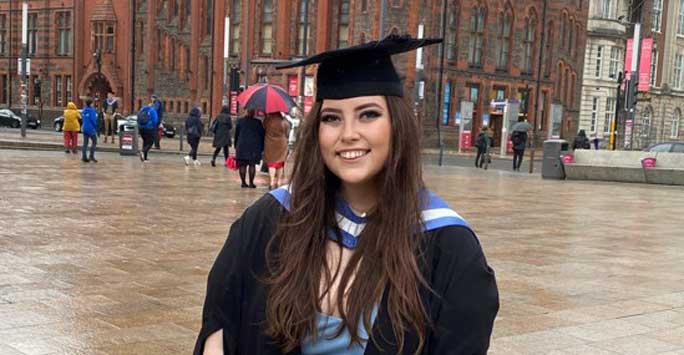Astrophysics
UCAS code F521
- Study mode
- Full-time
- Duration
- 4 years
- Start date and application deadlines
-
- Start date
UCAS code F521
A degree in Astrophysics has the unique potential to provide an understanding of the most up-to-date discoveries in our universe. You’ll be introduced to all aspects of physics and astronomy, from quantum mechanics to cosmology. Astrophysics (MPhys) is taught jointly by world-leading academics from the University of Liverpool and Liverpool John Moores University.
From the formation, evolution and deaths of stars (involving planetary systems, nucleosynthesis and supernovae) through structure of galaxies to the evolution of the Universe itself, the degree structure introduces the physics involved in the cosmos. At the end of Year Two, the week-long field trip to the Teide Observatory in Tenerife introduces students to professional observatories.
Anyone who is curious about the fundamental laws of nature will enjoy Physics. It is one of the few disciplines that really challenge our view of the world. For example, in relativity we find that space and time are entangled and that clocks run slowly under the influence of a gravitational field. When we examine the world on a microscopic scale, we are in the realm of quantum mechanics, where the predictions, such as wave-particle duality, even seem strange to the physicists who study its foundations.
The four-year Astrophysics degree will equip students with skills relevant for jobs in a wide range of careers, from education, research, finance and the city to industry.
The two-metre aperture Liverpool Telescope located in the Canaries, which is the largest robotically controlled telescope in the world, will provide you with unique access to observations from a major research facility when you undertake a research project in your final year.
There are opportunities to work alongside our internationally renowned academics at projects at the LHC at CERN and in many international and national research centres in the USA, Canada, Japan, Korea and many European countries.
Our flexible programmes allow students to transfer up to the end of year two between any of the physics programmes.
This programme also has a year abroad option, an incredible opportunity to spend an academic year at one of our partner universities. On the 4-year integrated masters programme, you can go abroad either between Year 2 and 3 (apply in Year 2) OR Year 3 and 4 (apply in Year 3).
Our programmes are accredited by the Institute of Physics, which means they satisfy the academic requirements for Chartered Physicist status.
This course is taught jointly by world-leading academics from the University of Liverpool and Liverpool John Moores University.
This programme is accredited by the Institute of Physics, which means it satisfies the academic requirements for Chartered Physicist status. The Institute of Physics is the professional body for physics in the UK and Ireland.

This course is taught jointly by world-leading academics from the University of Liverpool and Liverpool John Moores University.

We’re proud to announce we’ve been awarded a Gold rating for educational excellence.
Discover what you'll learn, what you'll study, and how you'll be taught and assessed.
Your first year starts with a one-week project, designed to familiarise you with the staff and other students. There will be two mathematics modules in each of the first two years, which will provide the mathematical skills required by physics students.
Programme details and modules listed are illustrative only and subject to change.
In year two, you will broaden your understanding of physics, with modules designed to ensure you have mastered the full range of its concepts.
There is a week-long field trip to the Teide Observatory in Tenerife, where students make astronomical measurements at a professional observatory. The two-metre aperture Liverpool Telescope, the largest robotically controlled telescope in the world, will provide you with unique access to observations from a major research facility when you undertake a research project in your final year.
Programme details and modules listed are illustrative only and subject to change.
In this year there is considerable scope to broaden out from core physics and choose amongst the optional modules available, mostly based around the research interests of the departmental staff.
Programme details and modules listed are illustrative only and subject to change.
In your final year, you will have considerable flexibility to choose between modules based around various astrophysics and physics research areas. You will also undertake an extended project with a member of staff, normally within their research area.
| Compulsory modules | Credits |
|---|---|
| PROJECT (MPHYS) (PHYS498) | 45 |
| THE INTERSTELLAR MEDIUM (PHYS495) | 15 |
Programme details and modules listed are illustrative only and subject to change.
Our research-led teaching ensures you are taught the latest advances in cutting-edge physics research. Lectures introduce and provide the details of the various areas of physics and related subjects. You will be working in tutorials and workshops, which are another crucial element in the learning process, where you put your knowledge into practice. All of our lecturers also perform world class research and use this to enhance their teaching.
Practical work is an integral part of the programmes, and ranges from training in basic laboratory skills in the first two years to a research project in the third or fourth year. You will undertake an extended project on a research topic with a member of staff who will mentor you. By the end of the degree you will be well prepared to tackle problems in any area and present yourself and your work both in writing and in person.
The main modes of assessment are coursework and examination. Depending on the modules taken you may encounter project work, presentations (individual or group), and specific tests or tasks focused on solidifying learning outcomes.
We have a distinctive approach to education, the Liverpool Curriculum Framework, which focuses on research-connected teaching, active learning, and authentic assessment to ensure our students graduate as digitally fluent and confident global citizens.
The Liverpool Curriculum framework sets out our distinctive approach to education. Our teaching staff support our students to develop academic knowledge, skills, and understanding alongside our graduate attributes:
Our curriculum is characterised by the three Liverpool Hallmarks:
All this is underpinned by our core value of inclusivity and commitment to providing a curriculum that is accessible to all students.
The qualifications and exam results you'll need to apply for this course.
| Qualification | Details |
|---|---|
| A levels |
BBC (including Mathematics: B and Physics: B) |
| BTEC Level 3 national extended diploma |
Not accepted for this programme. |
| BTEC combinations |
BTEC National Extended Certificate M plus BB including Mathematics grade B and Physics grade B at A level. |
| Welsh Baccalaureate Advanced |
C in the Welsh Baccalaureate, plus BB at A level to include Mathematics and Physics grade B. |
| Access |
Pass relevant Access to HE Diploma with 45 Level 3 credits with 27 at Distinction including 12 in Mathematics and 15 in Physics or 15 in Mathematics and 12 in Physics and 18 at Merit |
Studying with us means you can tailor your degree to suit you. Here's what is available on this course.
University of Liverpool students can choose from an exciting range of study placements at partner universities worldwide.
Immerse yourself in Chinese culture on an optional additional year at Xi'an Jiaotong Liverpool University in stunning Suzhou.
Broaden your world by spending an additional year of study at a partner university abroad following your second year of study.
Spend a summer abroad on a study placement or research project at one of our worldwide partner institutions.
Every student at The University of Liverpool can study a language as part of, or alongside their degree. You can choose:
This course is also available as a three year BSc (Hons) programme.
This course is delivered by the School of Physical Sciences, one of the UK’s leading physics departments, with a history of discovery that goes back over 130 years. Day-to-day teaching takes place in our £23 million award-winning, state-of-the-art Central Teaching Laboratories, which have transformed the way in which physical sciences are taught at the University.






Find out a little bit more about Physics at Liverpool from Professor Carsten Welsch, Head of the Physics Department.
From arrival to alumni, we’re with you all the way:

Physics gives you a chance to explain how the world works, from the tiny, atomic scale to the large. I've enjoyed the practicals, getting to grips with handling the equipment and the scientific methods. I’ve developed a lot of skills that I will apply throughout my life.

Want to find out more about student life?
Chat with our student ambassadors and ask any questions you have.
Third year student, Cara, gives her views on what its like studying Physics at Liverpool.
The skills gained through studying a degree in Astrophysics are marketable in a vast range of sectors. Typical areas of employment include research, industry, computing, teaching, business and finance.
Many graduates move on to have careers in such diverse areas as:
88% of physics students find their main activity after graduation meaningful.
(Graduate Outcomes, 2018-19.)
Hear what graduates say about their career progression and life after university.

Abbie graduated from our Physics MPhys course and is now undertaking a Physics PhD at the University of Liverpool.

Rosetta Mission Project Scientist and University of Liverpool alumnus, Dr Matt Taylor, talks cosmos, computers and The Cambridge.
Your tuition fees, how to pay, and other costs to consider.
Full-time place, per year - £9,535
Year abroad fee - £1,430 (applies to year in China)
Full-time place, per year - £29,100
Year abroad fee - £14,550 (applies to year in China)
The tuition fees shown are correct for 2025/26 entry. Please note that the year abroad fee also applies to the year in China.
Tuition fees cover the cost of your teaching, assessment, operating University facilities such as libraries, IT equipment, and access to academic and personal support. Learn more about paying for your studies.
We understand that budgeting for your time at university is important, and we want to make sure you understand any course-related costs that are not covered by your tuition fee. This could include buying a laptop, books, or stationery.
Find out more about the additional study costs that may apply to this course.
We offer a range of scholarships and bursaries that could help pay your tuition and living expenses.
If you’re a UK student joining an undergraduate degree and have a household income below £35,000, you could be eligible for a Liverpool Bursary worth up to £2,000 for each year of undergraduate study.
Apply for an Asylum Seekers Scholarship and you could have your tuition fees paid in full and receive help with study costs. You’ll need to have applied for asylum in the UK, or be the dependant of an asylum seeker, and be joining an eligible undergraduate degree.
If you’ve spent 13 or more weeks in Local Authority care since age 14, you could be eligible for a bursary of £3,000 per year of study. You’ll need to be a UK student joining an eligible undergraduate degree and be aged 28 or above on 1 September in the year you start.
Are you a UK student with a Black African or Caribbean heritage and a household income of £25,000 or less? You could be eligible to apply for a Cowrie Foundation Scholarship worth up to £8,000 for each year of undergraduate study.
If you’re a UK student identified as estranged by Student Finance England (or the equivalent UK funding body), you could be eligible for a bursary of £1,000 for each year of undergraduate study.
Joining a School of Biosciences degree and have a household income of less than £25,000? If you’re a UK student, you could apply to receive £4,500 per year for three years of your undergraduate course.
Do you live in the Liverpool City Region with a household income of £25,000 or less? Did neither of your parents attend University? You could be eligible to apply for a Nolan Scholarship worth £5,000 per year for three years of undergraduate study.
Are you a UK student with a household income of £25,000 or less? If you’ve participated in an eligible outreach programme, you could be eligible to apply for a Rigby Enterprise Award worth £5,000 per year for three years of your undergraduate degree.
Are you a UK student with a household income of £25,000 or less? Did neither of your parents attend University? You could be eligible to apply for a ROLABOTIC Scholarship worth £4,500 for each year of your undergraduate degree.
Apply to receive tailored training support to enhance your sporting performance. Our athlete support package includes a range of benefits, from bespoke strength and conditioning training to physiotherapy sessions and one-to-one nutritional advice.
Joining a degree in the School of Electrical Engineering, Electronics and Computer Science? If you’re a UK student with household income below £25,000, you could be eligible to apply for £5,000 a year for three years of study. Two awards will be available per academic year.
If you’re a young adult and a registered carer in the UK, you might be eligible for a £1,000 bursary for each year of study. You’ll need to be aged 18-25 on 1 September in the year you start your undergraduate degree.
Use our handy chatbot for your Clearing enquiries.
Last updated 17 June 2025 / / Programme terms and conditions